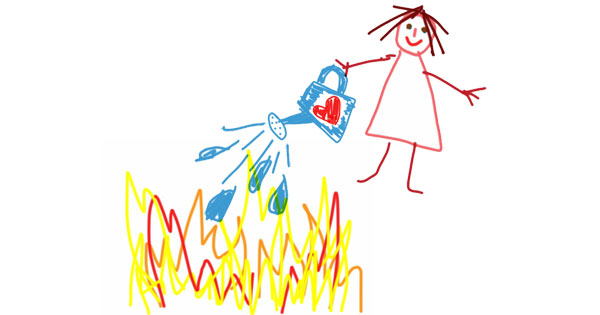I recently read a really interesting article on the drawbacks of the practice of teaching children about Hell; the article is here. And of course it got me thinking…so I thought I’d share my ‘take’ on it.
Many young children are taught the doctrine of ‘Hell’ in Sunday School from an early age. Personally, I believe it is wrong to begin a child’s spiritual education at that level of ‘bad news’. If the idea is to frighten a child into ‘belief’ in order to avoid said Hell, then that’s no way to bring a child into the love of God. The child will grow up with the primary concept of god as an ogre who spends most of his time being angry about most things, and being pretty pissed with everyone for most of the time. A god of punishment and wrath, rather than healing and mercy. A god who enjoys watching people burn in unquenchable flame. Who would want to love a god like that?
Well, you see, that’s not the God I know. My God is loving, caring, gentle, accepting, forgiving, longsuffering….look at Jesus and you look at what God is really like. Also, look at the Fruit of the Spirit; how is a believer showing the Fruit of the Spirit going to be a better, or more loving, person, than God, no matter how much Fruit he displays? God surely cannot show less of the lovely nature of these Fruits than the people He dwells in? No, God is good, by everything that makes sense and everything that logic dictates about His nature as revealed by Jesus and the nature He intends His people to exhibit. Nothing else makes any sense.
Personally I think that giving kids the doctrines of Hell early in life is getting it back to front. I’d far rather children were brought up knowing the Love of God right from square one, and maybe, just maybe, learn about all that nasty stuff later in life. Much later. Or maybe even not at all. If the doctrine of Hell is a false doctrine, which is not beyond the realms of possibility, then it’s better not to be taught it at all.
And basing a salvation doctrine on Bad News rather than Good News is completely wrong. Jesus came to preach the Kingdom of God; He only spoke (apparently) of Hell in passing, it certainly was not a central tenet of His teaching. So why, then, are children subjected to this teaching at an early age? My own somewhat cynical mindset suspects that perhaps it’s yet another control issue, perhaps to keep unruly youngsters in line? Sick.
Why not simply tell the kids how much God loves them, teach them how to live His Kingdom, teach them how to heal the sick, how to worship, how to love God. This is the correct foundation we should teach in Sunday Schools. Make it real, make it interesting, make it supernatural! In this way, you’re setting them up for a lifetime of service and supernatural ministry demonstrating the Kingdom just like Jesus did. In fact, the childlike spirit is vitally important in developing the ability to live a Kingdom lifestyle. Here’s my article on becoming like little children; see how the concepts fit together.
Many believers have struggled – and continue to struggle – with the idea of Hell. Supposedly, it’s a place of never-ending torment where the ‘lost’ spend eternity. Personally, I too struggle with that concept. In fact, the idea of Hell does not fit with the person of the Jesus I know. I’m currently reading a book on just that concept, called The Lie of Hell, by Roger Harper, a well-known Anglican writer and minister. There is an excellent review of the book on my friend David Matthew’s site, and here’s the link to it. The review also contains a deeper review of the salient points, and I strongly recommend it.
In fact, it’s not only children who are damaged by the doctrine of Hell. To try to ‘scare’ anyone – child or adult – into the Kingdom is to miss the point of Jesus’s teaching. Jesus came to tell us how much God loves us; He came to show us the Kingdom of God and to demonstrate its presence by His miracles. The concept of Hell is not a central teaching of Christ at all, and should not be taught as such. The very first teaching that needs to be reinforced in believers is that of God’s Love, not His wrath. Hell, if it is taught at all, needs to be taught as a ‘some people believe this, and here’s the arguments for both sides’ kind of thing, not as a cast-iron certain doctrine. Again, it’s so far better to train new disciples in the positive things, the things of the Kingdom – reconciliation, healing, forgiveness, fruitfulness – than it is negative things like Hell.
I really hope all this makes sense to you. If not, please ask for clarification, or maybe come back to it once you’ve chewed it over in your mind.
Scripture says, in Philippians 4:8, “Finally, brothers and sisters, whatever is true, whatever is noble, whatever is right, whatever is pure, whatever is lovely, whatever is admirable–if anything is excellent or praiseworthy–think about such things“. I don’t think that Hell falls into any of these categories, do you?
Edit: In case the original article ever disappears from the Internet, here it is in full, copied and pasted:
Teaching Children About Hell

I was a morbidly fearful child. I was also a highly literate child, having learned to read before school years. My mother tongue is Mandarin, and the storybooks I consumed were Chinese folk stories. Some of them were harmless tales of developing moral character, but many recounted ancient Chinese myths of hell. In Chinese folk religion, hell consists of eighteen levels, each containing a specific type of torture reserved for corresponding sins. It is not a stretch to say that the images of hell I saw in picture books as a young girl impact me to this day. I was terrified.
Fast forward to my school-age years, when my parents sent me to a Christian school started by western missionaries, where I learned of the Jesus who could save me from hell. It was a no-brainer for me. I believed swiftly because I was deathly afraid of hell.
I have told this testimony many, many times throughout my growing up years in the Christian world. It was the ice-breaker to my testimony, the chuckle-inducing anecdote to begin a speech: “I accepted Jesus because I didn’t want to go to hell!” People would smile and nod with approval at my child-like faith. How did nobody tell me it was not funny?
Certainly, as I grew in cognitive and spiritual development, I learned there was more to the Christian life than an escape from hell, but once you begin a relationship with God based on fear it takes years to unlearn the image of the punitive God to be able to receive the heart of the gospel of grace. It was true for me.
Aside from universalists, most Christian traditions contain the doctrine of judgment, although the particulars of how that judgment is carried out varies along a spectrum. Whether it is actual physical torture for all eternity or some sort of separation from God, whether there’s purgatory or a second chance post mortem, there exists a form of judgment within the systems of Christian faith.
Good parenting sensibilities tell us we shouldn’t shy away from difficult truths, and although we try to be age-appropriate, we are obligated to share even the most unpalatable aspect of the Christian faith with our kids.
The problem is: children don’t yet have the emotional maturity and logical capability to process a belief in eternal punishment. Their budding minds can’t reason through the theological necessity of judgment in a loving God. So they panic and retreat into fear. In order to coax them out of their distress we comfort them: it’s okay, Jesus will save you, just believe in Jesus.
And so it begins, even as kids develop and eventually learn the nuances of Christian life, they are bearing the invisible baggage of fear that had them grasping for Jesus. The genesis of a relationship with a good and loving God is a child’s nightmare.
If we are really honest with ourselves, we plant fear into our children’s hearts because we have not yet uprooted fear from our own. We want our children saved because we are so afraid of what would happen if they are not.
Before we can raise our children un-fundamentalist, we must excavate the nasty enemy of fear from deep within our hearts and boot it for good. Despite strong Christian traditions on the doctrines of heaven and hell, the afterlife remains an unknown mystery. To tell children you know for sure what will happen is to to be dishonest, and to act, well, as a fundamentalist.
It is bad religion to scare children into conversion and to dictate their morality from the basis of fear.A strong desire for our children to know God and follow God need not and should not come from a fear for their eternal destination. Spiritual security for our kids doesn’t mean an assurance they will escape the fates of fiery doom, it means providing security rooted in the love of God. Just as we do all we can to provide for the physical and emotional needs of our children, so we must give them this safe spiritual environment.
God loves you without condition. God will never leave your side. God delights in you. God is like the mother hen gathering chicks. God is like the forgiving father welcoming his prodigal son. God is like a warm fire on a cold night, bringing you comfort. God cares beyond what you can imagine.
God loves you. God loves you. God loves you.
This doesn’t guarantee the child will grow to believe in God. It doesn’t mean the hard conversations about suffering, judgment and injustice won’t be had when the child is old enough to tackle these issues. It does mean, however, that should they choose to live a life of faith, of belief in God, that it would not have come from a place of fear. Hopefully, it will mean they were compelled by the truths and love they witnessed in the lives of their parents, community, and the acts of God in the world.
When I was a young convert, having believed I was safe from hell because of a belief in Jesus, I remained terrified—because my parents had not yet become Christians. I spent agonizing hours praying desperately for them, willing there to not be an accident that took their lives before they converted. I wish I knew then what I know now, that the weight of the eternal damnation of my loved ones was far too heavy for my young, frail shoulders to carry. I wish I knew and believed God loves everyone, that we don’t know for sure what will happen after death, that choosing to love trumps fear.
I will not repeat this mistake with my children. I will not be afraid for their salvation. I am choosing to channel my childhood fears into a fierce force of love for them, in the best ways I know how.
And may they know that I have only ever been able to love them the way I do because the God who loves them so, also loves me.
– Cindy Brandt


















